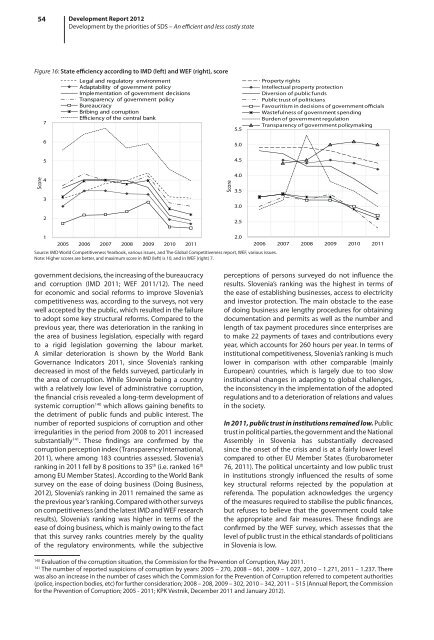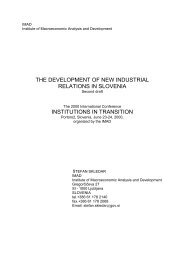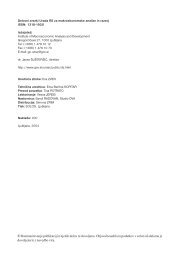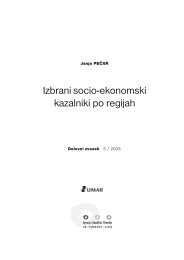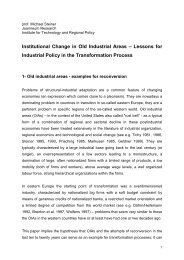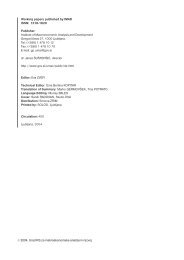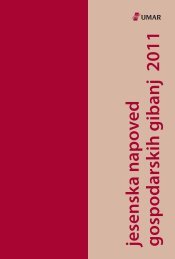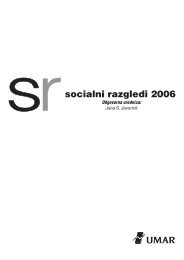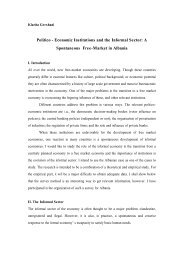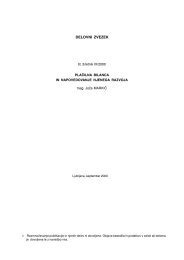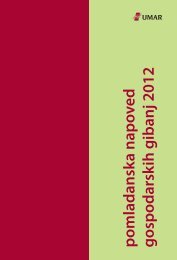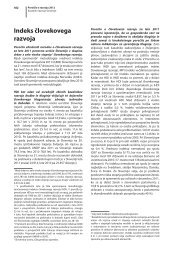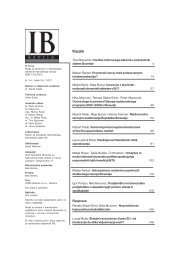development report 2012 - UMAR
development report 2012 - UMAR
development report 2012 - UMAR
Create successful ePaper yourself
Turn your PDF publications into a flip-book with our unique Google optimized e-Paper software.
54 Development Report <strong>2012</strong><br />
Development by the priorities of SDS – An efficient and less costly state<br />
Figure 16: State efficiency according to IMD (left) and WEF (right), score<br />
7<br />
6<br />
Legal and regulatory environment<br />
Adaptability of government policy<br />
Implementation of government decisions<br />
Transparency of government policy<br />
Bureaucracy<br />
Bribing and corruption<br />
Efficiency of the central bank<br />
5.5<br />
5.0<br />
Property rights<br />
Intellectual property protection<br />
Diversion of public funds<br />
Public trust of politicians<br />
Favouritism in decisions of government officials<br />
Wastefulness of government spending<br />
Burden of government regulation<br />
Transparency of government policymaking<br />
5<br />
4.5<br />
Score<br />
4<br />
3<br />
2<br />
Score<br />
4.0<br />
3.5<br />
3.0<br />
2.5<br />
1<br />
2005 2006 2007 2008 2009 2010 2011<br />
Source: IMD World Competitiveness Yearbook, various issues, and The Global Competitiveness <strong>report</strong>, WEF, various issues.<br />
Note: Higher scores are better, and maximum score in IMD (left) is 10, and in WEF (right) 7.<br />
2.0<br />
2006 2007 2008 2009 2010 2011<br />
government decisions, the increasing of the bureaucracy<br />
and corruption (IMD 2011; WEF 2011/12). The need<br />
for economic and social reforms to improve Slovenia’s<br />
competitiveness was, according to the surveys, not very<br />
well accepted by the public, which resulted in the failure<br />
to adopt some key structural reforms. Compared to the<br />
previous year, there was deterioration in the ranking in<br />
the area of business legislation, especially with regard<br />
to a rigid legislation governing the labour market.<br />
A similar deterioration is shown by the World Bank<br />
Governance Indicators 2011, since Slovenia’s ranking<br />
decreased in most of the fields surveyed, particularly in<br />
the area of corruption. While Slovenia being a country<br />
with a relatively low level of administrative corruption,<br />
the financial crisis revealed a long-term <strong>development</strong> of<br />
systemic corruption 140 which allows gaining benefits to<br />
the detriment of public funds and public interest. The<br />
number of <strong>report</strong>ed suspicions of corruption and other<br />
irregularities in the period from 2008 to 2011 increased<br />
substantially 141 . These findings are confirmed by the<br />
corruption perception index (Transparency International,<br />
2011), where among 183 countries assessed, Slovenia’s<br />
ranking in 2011 fell by 8 positions to 35 th (i.e. ranked 16 th<br />
among EU Member States). According to the World Bank<br />
survey on the ease of doing business (Doing Business,<br />
<strong>2012</strong>), Slovenia’s ranking in 2011 remained the same as<br />
the previous year’s ranking. Compared with other surveys<br />
on competitiveness (and the latest IMD and WEF research<br />
results), Slovenia’s ranking was higher in terms of the<br />
ease of doing business, which is mainly owing to the fact<br />
that this survey ranks countries merely by the quality<br />
of the regulatory environments, while the subjective<br />
perceptions of persons surveyed do not influence the<br />
results. Slovenia’s ranking was the highest in terms of<br />
the ease of establishing businesses, access to electricity<br />
and investor protection. The main obstacle to the ease<br />
of doing business are lengthy procedures for obtaining<br />
documentation and permits as well as the number and<br />
length of tax payment procedures since enterprises are<br />
to make 22 payments of taxes and contributions every<br />
year, which accounts for 260 hours per year. In terms of<br />
institutional competitiveness, Slovenia’s ranking is much<br />
lower in comparison with other comparable (mainly<br />
European) countries, which is largely due to too slow<br />
institutional changes in adapting to global challenges,<br />
the inconsistency in the implementation of the adopted<br />
regulations and to a deterioration of relations and values<br />
in the society.<br />
In 2011, public trust in institutions remained low. Public<br />
trust in political parties, the government and the National<br />
Assembly in Slovenia has substantially decreased<br />
since the onset of the crisis and is at a fairly lower level<br />
compared to other EU Member States (Eurobarometer<br />
76, 2011). The political uncertainty and low public trust<br />
in institutions strongly influenced the results of some<br />
key structural reforms rejected by the population at<br />
referenda. The population acknowledges the urgency<br />
of the measures required to stabilise the public finances,<br />
but refuses to believe that the government could take<br />
the appropriate and fair measures. These findings are<br />
confirmed by the WEF survey, which assesses that the<br />
level of public trust in the ethical standards of politicians<br />
in Slovenia is low.<br />
140<br />
Evaluation of the corruption situation, the Commission for the Prevention of Corruption, May 2011.<br />
141<br />
The number of <strong>report</strong>ed suspicions of corruption by years: 2005 – 270, 2008 – 661, 2009 – 1.027, 2010 – 1.271, 2011 – 1.237. There<br />
was also an increase in the number of cases which the Commission for the Prevention of Corruption referred to competent authorities<br />
(police, inspection bodies, etc) for further consideration; 2008 – 208, 2009 – 302, 2010 – 342, 2011 – 515 (Annual Report, the Commission<br />
for the Prevention of Corruption; 2005 - 2011; KPK Vestnik, December 2011 and January <strong>2012</strong>).


